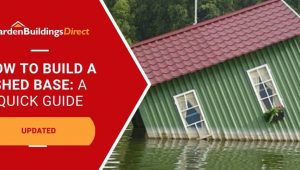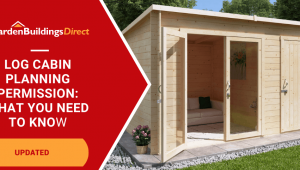Jump to:
When shopping for garden storage, the choice of materials can make a difference in terms of appearance, maintenance, and longevity. But what are your options?
Would you prefer the classic look of wood? Is metal’s durability worth the cost? Or maybe the low-maintenance benefits of plastic suits you better?
In this blog, we’ll go over the characteristics of each material. By the end, you’ll have a better understanding and idea of which option best meets your needs.
Wood in Garden Sheds

Wood is a strong and flexible material to work with, which makes it a top choice for outdoor buildings like sheds. It has a classic charm to it, adding a warm, rustic feel when set up in gardens. This is why it’s favoured by homeowners who want a traditional look or the flexibility to customise, like with paint, as wood can be stained to match different styles.
When it comes to strength, wood is undeniably durable, especially if it’s treated properly, e.g., through pressure treatment. This treatment is standard in many models, though it may come at a bit higher price than untreated options. It’s a worthwhile investment, though, as it cuts the need for maintenance and repairs, saving you money in the long run.
And how can we not mention the popular tongue and groove (T&G) construction used in many wooden sheds? T&G is a special method where boards slot together like puzzle pieces, creating a protective outer layer. This design improves insulation and weather resistance, and gives the shed a neat, polished look. For this level of quality and finish, look no further than tongue and groove sheds.
But that’s not all—timber’s natural insulation properties are a bonus. They help regulate temperature and moisture inside the shed, particularly in hot weather. However, this benefit isn’t enough on its own. This cues the need for proper insulation and regular maintenance.
To give you an idea, here’s what can happen to wooden sheds when it’s too hot. This highlights their upkeep demands, so keep that in mind when considering this material for your storage needs.
Metal in Garden Storage

Metal storage is incredibly strong, thanks to its innate heavy-duty material. Not only are metal storage units weather- and insect-resistant, but they’re also fire-resistant. For one, metal has a much higher melting point, so it conducts heat away from a fire rather than catching or burning easily. This is a huge advantage if reducing fire risks is a priority for your property.
Did we mention that most metal sheds, especially those made from galvanised and powder-coated steel, require very little maintenance and are easy on the wallet?
Metal is lower cost to manufacture into shed parts, making it a cheaper shed material. And here’s the best bit—no need for annual re-staining or reapplying UV protectants. These upfront savings can make a big difference if you’re on a budget or keen to keep costs down.
But there’s a catch: rust. While metal resists many elements, it can still rust if its coating becomes damaged and the bare metal is exposed. Preventing this usually doesn’t require much in the way of maintenance; it is more about taking good care of the item and preventing damage to the galvanised coating.
For tips that actually work, take a look at this guide: How to Stop a Metal Shed from Rusting
Plastic in Garden Sheds

You might assume plastics are weak materials by definition, but the truth is quite the opposite. Modern plastics used in sheds and storage boxes are surprisingly strong, adaptable, and easy to care for.
Two popular materials used are vinyl and polycarbonate. Vinyl sheds are made from PVC (polyvinyl chloride) panels reinforced with metal. They’re durable and weather-resistant, but they can crack or fade over time if not well maintained.
Polycarbonate sheds are made from a more advanced type of plastic. They’re virtually unbreakable and resistant to fading, cracking, and discolouration. Plus, polycarbonate is lighter and easier to assemble than vinyl.
Plastic sheds, in general, are more resistant to pests and insects than wood sheds. This is because plastic materials provide less favourable conditions for pests to infest. This reduces the risk of damage from termites, rodents, or other insects. Even better, they can withstand harsh weather conditions and are UV-resistant. This means they won’t fade or crack under prolonged sun exposure.
Of course, there are some downsides. Plastic sheds aren’t fire resistant and can be susceptible to dampness under certain conditions. In this guide, ‘Do Plastic Sheds Get Damp?’ We explain the factors that contribute to moisture build-up and how you can prevent it.
Round-up
Outdoor storage units, whether it’s a shed or a storage box, come in wooden, metal, and plastic materials. Each offers unique characteristics, along with its pros and cons. The benefits are worth considering, while the drawbacks are often down to lack of maintenance—something that can be managed with proper care. Always consider your preferences and the level of maintenance you’re willing to invest in.
For a wide range of options, have a look at our garden sheds for sale. This guide can also help with your buying decision, so be sure to read it: Guide to the Best Garden Storage Solutions.





